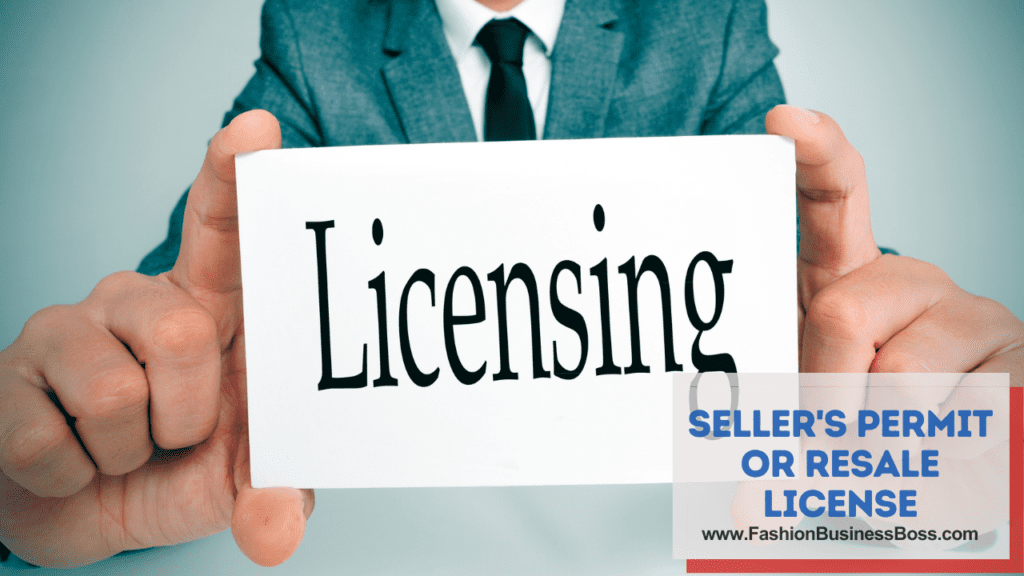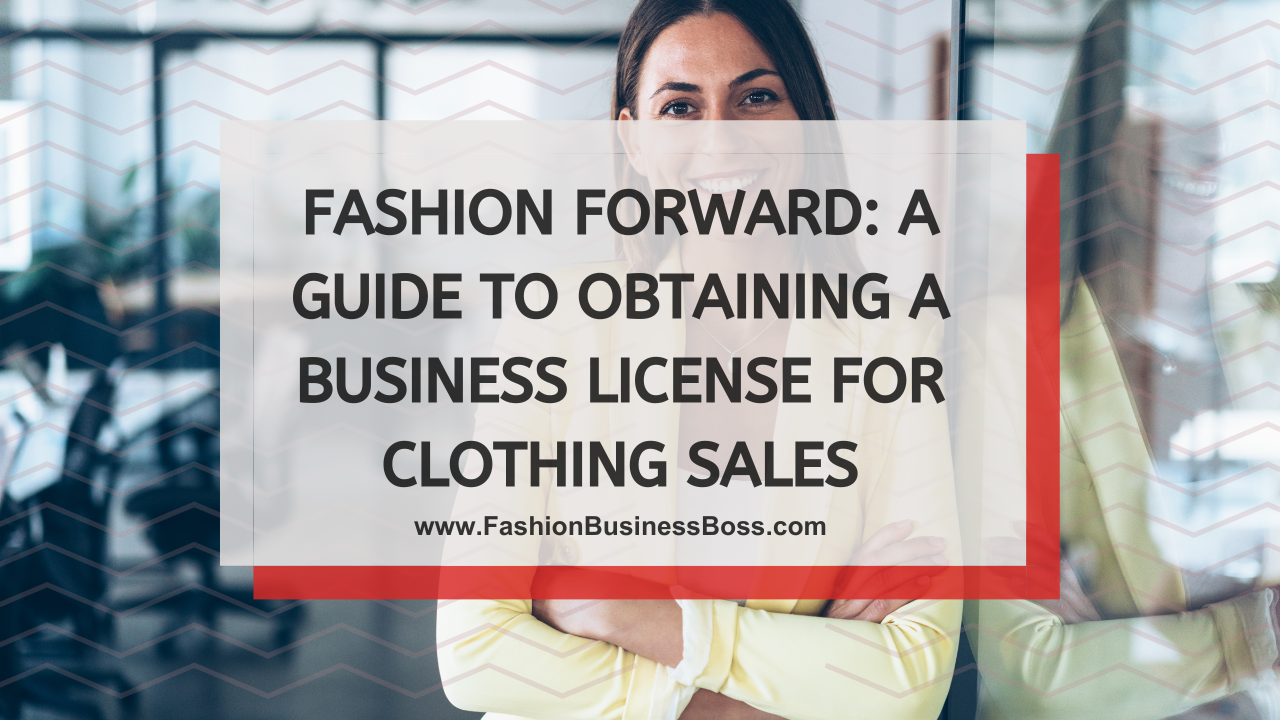Starting a clothing business can be an exciting venture, but it requires proper planning and compliance with legal regulations. One critical aspect of setting up a clothing business is obtaining a business license. A business license is a legal requirement that grants you the authority to operate a business within a specific jurisdiction.
To get a business license to sell clothes, start by researching your target market and developing a solid business plan. Register your business structure, choose a suitable location, and secure a unique business name. Obtain a Tax Identification Number (TIN) and comply with health and safety regulations. Apply for the license with required details and pay the application fee. Don’t forget the seller’s permit for retail sales. Stay updated with regulations for a successful clothing venture.
Research and Planning
Before embarking on the business license application process, thorough research and a well-developed business plan are crucial for the success of your clothing venture. Start by identifying your target market, niche, and competitors within the clothing industry. Understanding your potential customers’ preferences and needs will help you tailor your products and marketing strategies effectively. Whether you plan to cater to a specific age group, offer sustainable fashion, or focus on high-end apparel, defining your niche will set you apart in the market.
Determining the type of clothing you wish to sell is vital. Whether it’s casual wear, formal attire, children’s clothing, or specialized apparel, this decision will influence your inventory, suppliers, and branding. Conduct market research to identify trends, pricing, and potential demand for your chosen clothing products.
Crafting a comprehensive business plan is essential for a successful clothing business. Outline your business goals, marketing strategies, sales projections, and financial plans. A well-defined business plan not only helps you understand your market better but also serves as a valuable tool when seeking funding from potential investors or applying for business loans. It demonstrates your commitment and professionalism to authorities and stakeholders, instilling confidence in your venture’s viability and potential for growth.
Business Structure and Registration
Choosing the appropriate legal structure for your clothing business is a critical decision that will impact various aspects of your operations. The most common options include sole proprietorship, partnership, limited liability company (LLC), and corporation.
A sole proprietorship is the simplest and most common business structure, where you are the sole owner of the business and personally liable for all debts and liabilities. Partnerships involve two or more owners who share responsibilities, profits, and liabilities. An LLC provides liability protection for its owners, shielding personal assets from business debts. Corporations, on the other hand, are separate legal entities with shareholders, offering limited liability to owners but involve more complex administrative requirements.
After choosing your business structure, register it with the appropriate local or state authorities. This step is crucial as it establishes your clothing business as a distinct legal entity separate from yourself. By doing so, your personal assets will be protected from business liabilities, reducing your personal financial risk.
Complying with registration requirements not only fulfills legal obligations but also instills trust and credibility with customers, suppliers, and potential partners. It also allows you to operate under your chosen business name, promoting brand recognition and continuity.
Location and Zoning
Selecting the right location is a critical factor that can significantly impact the success of your clothing business. Whether you decide to establish a brick-and-mortar store or operate primarily through an online platform, the location’s suitability and adherence to local zoning regulations are paramount.
Zoning laws are put in place by local governments to designate specific areas for particular types of businesses, residences, or industrial activities. These regulations ensure that businesses operate in compatible zones, maintaining the safety, aesthetics, and convenience of the community. Before finalizing your business location, consult with your local planning department to understand the zoning restrictions and requirements.
Applying for a zoning permit is an essential step to confirm that your chosen location is suitable for selling clothes. The process may involve submitting documents and plans that demonstrate your compliance with zoning regulations. Additionally, you may need to attend public hearings or seek community feedback before obtaining approval.
Choosing a location that aligns with your target market and complements your business strategy can lead to increased foot traffic and visibility. Factors such as accessibility, proximity to your target customers, and local competition should also be considered when making your decision. A well-planned and properly zoned location sets a solid foundation for your clothing business’s growth and success.
Naming Your Business

Your clothing business’s name plays a significant role in shaping your brand identity and attracting customers. It should be unique, memorable, and reflective of your company’s vision and values. To ensure that your chosen name is available for use, conduct a comprehensive search to check if it’s already in use or registered by another business.
The search should cover not only business names but also trademarks and domain names to avoid potential legal conflicts and confusion. You can perform searches through business name databases, trademark databases, and domain registrars. Additionally, seek legal advice to ensure your chosen name does not infringe on existing trademarks.
Once you’ve confirmed that your desired name is available, register it with the appropriate local or state agency. This step is crucial to protect your business’s brand identity and prevent others from using the same name. Registering your business name legally establishes your exclusive rights to it within your jurisdiction, granting you legal protection and recourse against potential infringers.
A well-chosen and properly registered business name can give your clothing business a competitive edge, facilitate brand recognition, and enhance your marketing efforts. Take the time to select a name that resonates with your target audience and accurately represents your brand’s essence.
Read more about How To Come Up With A Brand Name For Your Clothing
Tax Identification Number
A Tax Identification Number (TIN) or Employer Identification Number (EIN) is a unique identifier issued by the Internal Revenue Service (IRS) for tax purposes. It is a crucial requirement for every clothing business, as it facilitates proper tax reporting and compliance. The TIN or EIN is used to identify your business entity when filing tax returns, paying taxes, and conducting other tax-related transactions.
If your clothing business has employees or operates as anything other than a sole proprietorship, you must obtain an EIN. This includes partnerships, LLCs, and corporations. Sole proprietors who don’t have employees can use their Social Security Number (SSN) for tax purposes, but obtaining an EIN is recommended to protect their SSN from potential identity theft.
Applying for an EIN is a straightforward process. You can apply online through the IRS website, which is the most efficient and convenient method. The online application usually takes only a few minutes to complete, and you’ll receive your EIN immediately after submitting the required information.
Having a TIN or EIN ensures that your clothing business complies with tax regulations, avoids potential penalties, and simplifies tax-related record-keeping. It also separates your business’s tax responsibilities from your personal taxes, making it easier to manage your financial obligations.
Business License Application
With your business plan in place and necessary legal steps taken, you are now ready to apply for your business license. The application process may vary depending on your location and the specific regulations governing business licenses in your city or state.
To start, conduct thorough research to understand the requirements and documentation needed for the application. Some common information you’ll need to provide includes details about your clothing business, its location, and your personal information. The application may also require you to provide your business structure, zoning compliance, and any necessary permits you’ve obtained.
There may be an application fee associated with submitting your business license application. The fee amount varies depending on the jurisdiction and the type of business you are operating. Ensure you have the necessary funds to cover this cost when applying.
Once you’ve completed the application and provided all required documents, the processing time may vary. It’s essential to follow up on your application’s status and be prepared to respond to any inquiries from the licensing authority if needed.
Obtaining a business license is a crucial step to legalize your clothing business and demonstrate your commitment to operating within legal boundaries. It grants you the authority to conduct business activities, protects you from potential legal issues, and enhances your credibility with customers and partners.
Compliance with Health and Safety Regulations
As a responsible clothing business owner, ensuring the safety and well-being of your customers and employees is of utmost importance. Compliance with health and safety regulations is essential to create a safe environment in your physical store and provide consumers with reliable products online.
If you operate a brick-and-mortar store, you may be required to obtain health permits or undergo inspections to meet specific safety standards. These permits are issued by local health departments and typically focus on factors such as hygiene, sanitation, fire safety, and building codes. Regular inspections help identify potential hazards and ensure that your store meets all necessary requirements to safeguard both customers and employees.
Even if your clothing business operates solely online, you must adhere to product safety regulations and consumer protection laws. Ensure that the clothing items you sell comply with industry standards and safety requirements, especially when it comes to materials and components that come into direct contact with consumers’ skin. Additionally, provide accurate and transparent information about your products to avoid potential legal issues and maintain customer trust.
Staying informed about relevant health and safety regulations and incorporating best practices into your business operations can significantly reduce the risk of accidents, product recalls, or legal disputes. Prioritize the well-being of your customers and employees, as it will enhance your business’s reputation and contribute to long-term success.
Seller’s Permit or Resale License

If your clothing business involves selling products at the retail level, obtaining a seller’s permit or resale license is essential. This permit allows you to collect sales tax from your customers and remit it to the appropriate tax authorities. Sales tax varies by state, so you must be aware of the specific rates and requirements in your jurisdiction.
To apply for a seller’s permit, you’ll typically need to submit an application to your state’s tax agency or department of revenue. The application may require you to provide details about your clothing business, including its legal structure, location, and projected sales. Some states may also request information about your suppliers and inventory.
Having a seller’s permit ensures that you are in compliance with tax regulations and that you are fulfilling your tax obligations as a retail business. It is essential to keep accurate records of your sales transactions and tax collections to facilitate smooth reporting and tax remittance.
As a responsible business owner, obtaining a seller’s permit not only demonstrates your commitment to operating within legal parameters but also prevents potential penalties or legal issues related to tax non-compliance. By obtaining this permit, you can confidently conduct retail sales of clothing items while adhering to all relevant tax laws.
Read more about We Answer: Does A Clothing Line Need A Business License?
Conclusion
Obtaining a business license to sell clothes is a fundamental step towards establishing a successful clothing business. By conducting thorough research, developing a comprehensive business plan, and adhering to all legal requirements, you’ll position your clothing venture for growth and prosperity. Remember to stay updated with the latest regulations and compliance standards, as they may change over time. With determination and a clear vision, you can turn your passion for fashion into a thriving business.
Frequently Asked Questions

1. Are there specific health and safety regulations I need to follow?
Yes, as a clothing business, you must comply with health and safety regulations to ensure the well-being of your customers and employees.
2. Do I need a seller’s permit or resale license to sell clothes?
If you plan to sell clothing items at a retail level, you’ll likely need a seller’s permit or resale license. This permit allows you to collect sales tax from your customers.
3. Can I apply for a business license online?
Yes, many jurisdictions offer online application options to streamline the process. Check with your local government’s website for specific instructions.
To learn more about starting your own clothing business, check out my startup documents here.
Please note that the contents of this blog are for informational and entertainment purposes only and should not be construed as legal advice. Any action taken based on the information provided in this blog is solely at your own risk. Additionally, all images used in this blog are generated under the CC0 license of Creative Commons, which means they are free to use for any purpose without attribution.

Meet Shawn Chun: Entrepreneur and Fashion Business Fan.
I’m a happy individual who happens to be an entrepreneur. I have owned several types of businesses in my life from a coffee shop to an import and export business to an online review business plus a few more and now I create online resources for those interested in starting new ventures. It’s demanding work but I love it. I do it for those passionate about their business and their goals. That’s why when I meet a designer or boutique owner at a craft fair, farmers market, retail location or anywhere else I see myself. I know how hard the struggle is to retain clients, find good employees and keep the business growing all while trying to stay competitive.
That’s why I created Fashion Business Boss: I want to help fashion business owners like you build a thriving business that brings you endless joy and supports your ideal lifestyle.

